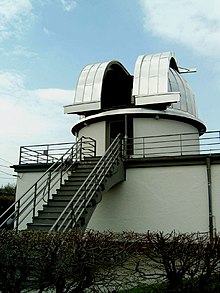Astronomy day
The Astronomy day (also called "Day of Astronomy") is an annual day of action , that of amateur astronomers to a wide audience is aligned and astronomical societies of some countries, the astronomy and general science to bring closer and to arouse their interest for it. For the first time, Astronomy Day 1973 took place in California under the motto "Bringing Astronomy to the People".
In German-speaking countries, Astronomy Day is usually held on a Saturday around the beginning of spring , so it often falls in the weeks before Easter. To avoid annoying moonlight, one chooses the beginning of the waxing moon phase. In other countries, however, an autumn date is sometimes preferred. The individual events are organized by local public observatories , planetariums , astro clubs and private individuals with lectures and guided tours .
history
The first Astronomy Day (English: Astronomy Day ) was launched in 1973 by the then President of the "Astronomical Association of Northern California " Doug Berger. His goal was to create public awareness for scientific and amateur astronomy with exhibitions and activities in one day. Since then, the concept has expanded greatly. Hundreds of astronomical societies, observatories , museums, colleges, and planetariums in the United States now participate in Astronomy Day.
In Germany the Astronomy Day has been held annually since 2003, in Switzerland since 2007 and in Austria at irregular intervals. The "Astronomins dag" has been held in Sweden since 2012. A similar project is being organized in France under the name “Nuits des Étoiles” (“Starry Nights”).
Germany and Switzerland
In Germany, the Astronomy Day is coordinated by the Vereinigung der Sternfreunde (VdS). In Switzerland it is organized by the Swiss Astronomical Society (SAG), coordinated since 2010 and in cooperation with the German VdS.
2003 to 2006
- August 3, 2003 (D): Mars theme , 141 events
- September 18, 2004 (D): Topic Milky Way , 180 events (VdS in cooperation with the "Long Night of the Stars", an action by Stern magazine , the European Southern Observatory and the Council of Planetariums)
- September 10, 2005 (D): “Our neighbors in space: Mars, moon and Venus”, 250 events
- September 16, 2006 (D): no topic, 173 events
2007 to 2009
- September 22, 2007 (CH): Zurich
- September 29, 2007 (D): no topic, 143 events
- September 6, 2008 (D): no topic
- September 20, 2008 (CH): Rapperswil, "Egyptology and Astronomy"
- April 4, 2009 (D): no topic
- September 12, 2009 (CH): Cantonal School Zug, "Astronomy and Philosophy"
Since 2010
- April 24, 2010: no topic
- April 9, 2011: no topic
- March 24, 2012: "The long night of the planets"
- March 16, 2013 (D): "Vagabonds of the solar system" (the comet C / 2011 L4 (PANSTARRS) approached the sun)
- April 20, 2013 (CH): "Let the universe show you"
- April 5, 2014: "Space deserts" (this meant all bodies of the solar system of which "desert" surfaces are known)
- 20./21. March 2015: "Shadow games"
- March 19, 2016: "Fascination Moon"
- March 25, 2017: “Sights to see on the Sonnenbahn”, 157 events on objects along the ecliptic
- March 24, 2018: "The Secret Life of the Stars"
- March 30, 2019: Light pollution issue
- originally March 28, 2020, postponed to October 24, 2020: "Venus, moon and the seven sisters"
Austria
In Austria , the Astronomy Day has been coordinated by the Austrian Society for Astronomy and Astrophysics (ÖGAA) since 2003 .
- May 10, 2003: 29 organizers with 98 events
- April 24, 2004: 27 organizers with 103 events
- April 16, 2005: 32 organizers with 129 events
- May 6, 2006
- May 19, 2007: Topic "Young Astronomy"
- May 10, 2008: Topic "Protection of the night sky"
- September 29 and 30, 2017
- March 30, 2019: Astronomical beginning of spring and farewell to the winter sky
- The date planned for March 28, 2020 has been canceled
See also
Web links
- Astronomy Day in Germany
- Astronomy Day in Switzerland
- Astronomins dag in Sweden ( Swedish )
- Astronomy Day in the United States ( English )
Individual evidence
- ↑ a b Sky & Telescope (Ed.): Celebrate Astronomy Day! April 28, 2012 ( skyandtelescope.com [accessed March 25, 2017]).
- ↑ Astronomy Day Fact Sheet. The Astronomical League, 2017, accessed March 25, 2017 .
- ↑ Astronomins dag och natt. Svenska Astronomiska Sällskapet, 2017, accessed March 25, 2017 (Swedish).
- ↑ Les Nuits des Étoiles. L'Association Française d'Astronomie, 2017, accessed on March 25, 2017 (French).
- ↑ a b Day of Astronomy. (No longer available online.) Swiss Astronomical Society, February 4, 2018, archived from the original on March 10, 2018 ; accessed on March 10, 2018 .
- ↑ a b c d e f Day of Astronomy. Astronomische Gesellschaft Bern, January 11, 2016, accessed on March 30, 2019 .
- ↑ Complete overview of Astronomy Day 2017. Vereinigung der Sternfreunde e. V., 2017, accessed March 25, 2017 .
- ↑ VdS editorial team: Astronomy Day 2018 on March 24th. The secret life of the stars. Vereinigung der Sternfreunde eV, 2017, accessed on March 10, 2018 .
- ↑ Astronomy Day 2019 on March 30th - May the night be with us. In: vds-astro.de. Vereinigung der Sternfreunde eV, 2019, accessed on January 10, 2019 .
- ↑ March 28, 2020 is Astronomy Day! In: astronomietag.de. Vereinigung der Sternfreunde eV, accessed on March 2, 2020 .
- ↑ Swiss Day of Astronomy. Retrieved May 7, 2020 .
- ↑ Astronomietage 2017. (No longer available online.) Archived from the original on September 9, 2017 ; accessed on September 8, 2017 .
- ↑ Sterngarten: On the Day of Astronomy (am_14.3._ABGESAGT). Retrieved May 7, 2020 (Austrian German).
